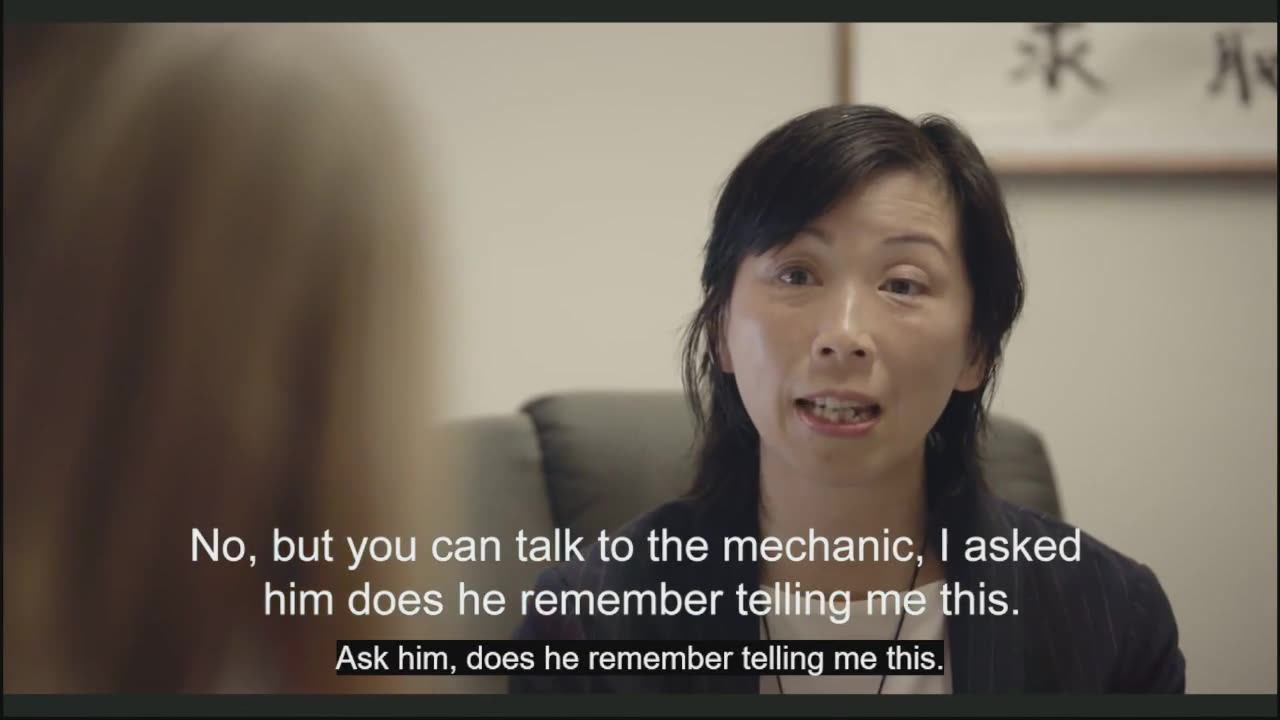Premium Only Content

The Long Game : A Stuff Circuit Documentary
A Stuff Circuit investigation reveals decades of foreign interference by China in New Zealand.
VIDEO CREDIT: Stuff Circuit
The stakes were already high around the state visit of Chinese Premier Li Qiang to New Zealand, the first such visit since 2017.
Now, a new Stuff Circuit documentary — The Long Game, watch above — is set to ramp up tensions further, with revelations that Chinese Communist Party influence and interference operations in New Zealand have been going on for decades, unabated, striking at the heart of our democracy.
Paula Penfold and Louisa Cleave report.
If Mr H was perturbed to find two journalists on his doorstep asking about his former life spying for the Chinese Communist Party, he didn’t show it.
It had been 27 years since he was sent to New Zealand to conduct espionage on members of the Chinese community who were “politically active about Taiwan’’.
When Stuff Circuit tracked down Mr H to an address in Auckland, he invited us in and called on a friend to interpret. He didn’t deny his previous life as an officer for China’s Public Security Bureau (PSB).
Mr H had given some insight into that former life in the process of applying for refugee status in 2007. The documents remain suppressed, though his lawyer, the late Peter Williams QC, told the Sunday Star Times back then: “There is not the slightest doubt he has been engaged in the secret service on behalf of the People’s Republic of China.” Mr H had apparently decided he preferred New Zealand’s democratic way of life and abandoned his mission.
He was eventually given refugee status, but as recently as 2020 was refused residency — his old life coming back to haunt him. In its judgment the Court of Appeal described Mr H’s former employer, the PSB, as having committed “gross human rights abuses”.
“Until the time is reached where it can be said that Mr H’s association with the PSB is remote, he remains ineligible.”
After our initial door knock, Mr H went quiet and denied our requests for an interview. But what little we can tell of his story is important precisely because it began so long ago: his arrival in 1996 is the earliest case of Chinese Communist Party (CCP) interference in New Zealand we investigated for the Stuff Circuit documentary The Long Game. And tellingly, it doesn’t even make the documentary — we gathered so much material it ended up on the cutting room floor.
Over the course of two years, in an effort to understand the nature and extent of CCP influence and interference in New Zealand, we spoke to dozens of people, and one by one they told us the apologue of the boiling frog: the tale being, of course, that a frog suddenly plunged into boiling water will jump out, but one placed in tepid water won’t perceive the danger. “Once you realise it’s boiling,” said one, “you’re already dead”.
Such a grave warning will inevitably mean that we and the sources for our investigation will be accused of xenophobia or sinophobia. The Chinese Embassy (which did not respond to multiple requests for an interview for the documentary) will no doubt — post-publication — label us anti-China, as its Consulate has in the past.
These accusations are undone, though, by the fact that the majority of our sources are Chinese New Zealanders.
We can’t name most of them, for reasons which will become apparent when you watch.
But this is their story, though it’s one that belongs to all of us: Their warning that China’s foreign interference is corroding our democracy.
Grace, we’ll call her, at first considers going on camera, but changes her mind after her family begs her not to. A professional, she came to New Zealand 26 years ago because it fitted her “idea of democracy”.
“I disagreed a lot with political leaders in China, but I dared not say anything. I hate the thought control. I needed freedom of speech, at least.”
For a time, she thought she had that here. But no longer. Increasingly, Grace is feeling the presence of the regime she fled, in ways most of us cannot see. “The invisible hands are everywhere,” she says.
Grace shows us screenshots from the Chinese social media app WeChat of what she says is a targeted campaign to discredit her over views she expressed — privately, she thought.
The comments in response are alarming, and scrolling through them Grace begins to cry.
“I came here, but I can’t escape the CCP.”
A few months later, we go with her to a suburban Auckland mall to meet two other Chinese women, who she says can help explain how someone in their community is collecting evidence on them and passing it to the Chinese Government. For an hour, they outline their concerns, including describing how the surveillance is carried out.
“She’s absolutely a professional spy,” they conclude.
We push for further proof, not because we don’t believe them, but because in order to publish what they say, we need evidence.
“We just all know, we can tell by her behaviour. There’s 20 or 30 of us you can talk to who will all tell you these things.”
From everything we hear and all we’ve learned about how the CCP carries out foreign interference, they are undoubtedly right.
But the evidence we have doesn’t meet the threshold. We can’t name the spy.
If it’s a difficult subject to report, it’s harder to regulate, or even speak about in any unguarded way, such is the diplomatic can of worms. Historically, intelligence agencies and their political masters have been coy about naming countries carrying out foreign interference.
So, when we interview Andrew Little, then-Minister Responsible for the NZ Security Intelligence Service, we’re surprised at his candour: he’s blunt, to a degree no previous minister in the role had been, telling us that of all the national security threats the SIS deals with, “half of their effort goes into foreign interference… and the country that gets most attention from our authorities is China”.
In August 2023, when the SIS published its first security threat environment report, it too went further than ever before, naming three countries it accused of conducting foreign interference in New Zealand: China, Russia, and Iran.
SIS Director-General Andrew Hampton told Stuff Circuit the “most persistent foreign interference activities in Aotearoa New Zealand [are] carried out by the People’s Republic of China”.
How foreign interference is defined is important, to distinguish it from normal and open diplomatic relations, which every country engages in. The activities the SIS is concerned about are those that are intended to influence, disrupt or subvert New Zealand’s national interests by deceptive, corruptive or coercive means.
Little and officials talking bluntly and naming countries was a strategic decision to bring into the open what usually only those with security clearance are privy to: that the threat environment is “rapidly evolving” and will require “a rapidly evolving response… in order to stay ahead of those who wish to cause us harm”.
‘’We want to demystify the threats we face,’’ Hampton told Stuff Circuit, adding that public awareness is the agency's most important tool for defending those threats.
The threat environment report highlighted an anonymised 2022 case of a foreign state secretly working with New Zealand-based community figures to persuade someone with political influence to change their position on a “subject of sensitivity”.
What that subject is remains open to conjecture, but there are a number of sensitive areas on which the CCP seeks to sway opinions: its persecution of Uyghurs in Xinjiang, for example. The Chinese Government knows it’s been successful when its talking points on Xinjiang are publicly repeated by people with influence, describing detention camps as “vocational training centres”.
Those influencers have been groomed, and fooled into thinking they’re talking to a Chinese community grassroots movement because they’ll hear the same thing from a number of different people. But it’s a coordinated effort, each person acting on instructions, and each required to report back and provide evidence they have undertaken the actions required of them.
You might think of this as an elaborate and cynical form of PR, aimed at tilting perceptions in China’s favour, which might not seem any different from the diplomatic actions of other states, but for that important definition: the practices are deceptive, corruptive, and coercive.
Then there’s the more sinister practice the SIS calls “societal interference”: acts targeting those perceived as dissidents — Chinese New Zealanders who oppose the CCP.
“Social media monitoring, media manipulation, deploying networks of motivated community contacts and covert intelligence operations are some of the tactics used to achieve their goals.”
The Chinese Embassy’s response to the SIS threat report was emphatic: “We... strongly deplore and firmly reject the content relating to China”.
“China always strictly follows the principle of non-interference in other countries’ internal affairs. The label of “interfering in other countries’ internal affairs” can by no means be pinned on China.”
The problem for the Chinese Embassy is that what the report sets out mirrors precisely what the many Chinese New Zealanders spoken to by Stuff Circuit describe.
Grace gets back in touch, after months of reconsidering whether she might go on camera.
“I’m afraid I need to think about my family,” she writes. “Sorry I haven’t been brave enough.”
In understanding how China carries out its foreign influence operations, there’s a fundamentally important term: united front. Lower case for the nature of the work, upper case for the United Front Work Department, the CCP agency responsible for coordinating influence operations, running proxies who cosy up to targets potentially useful for promoting CCP interests, while also working to suppress the voices of critics.
Those who carry out united front work in countries such as New Zealand often do so through Chinese community organisations so their activities appear benign, while also muddying the waters because some of those organisations perform useful social functions.
Stuff Circuit found extensive evidence of such united front organisations in New Zealand, and some of the people carrying out united front work. They are openly commended by Beijing, attending United Front Work Department conferences.
They front glitzy fundraisers and awards ceremonies, wholesome community events, dazzling cultural performances: nets for schmoozing targets and gathering intelligence, all the while offering proof-of-performance — photographs of the influential people in attendance — to higher-ups in Beijing.
The web of secretive united front work is a highly sophisticated gameplan hiding in plain sight, refined over decades. When the CIA published a list of united front organisations in 1957, the strategy had already been employed by the CCP for nearly 30 years.
If we are the frog in China’s pot, we’ve been simmering away for a very long time now, getting ever closer to boiling point.
-
 3:19:58
3:19:58
Tate Speech by Andrew Tate
9 hours agoEMERGENCY MEETING EPISODE 101 - STRENGTH AND HONOR
156K64 -
 1:48:09
1:48:09
The Quartering
6 hours agoLA Fires Are About To Get Way Worse, Trump Vs Vance On J6 Pardons, Brett Cooper Bombshell & More
98.6K39 -
 LIVE
LIVE
Dr Disrespect
6 hours ago🔴LIVE - DR DISRESPECT - MARVEL RIVALS - TOP 500 IN THE WORLD
2,858 watching -
 1:05:49
1:05:49
MTNTOUGH Fitness Lab
8 hours agoDamon West: How Faith and Mental Toughness Helped Me Escape Prison | MTNPOD #99
12.4K -
 1:43:05
1:43:05
The Criminal Connection Podcast
8 hours agoIAN MCCRANOR: World Champion Karate Doorman CRAZY Life Story, Mob Hits GONE WRONG & Video Game Star!
10.3K1 -
 38:25
38:25
otisframpton
2 hours agoPROCREATE DREAMS Animation Demo - Part 4 - Lighting & SFX!
21.1K -
 1:53:53
1:53:53
vivafrei
5 hours agoGavin Newsom's War With Elon! Stolen Humvees FOUND? Arson Suspect IDENTIFIED? Cali Updates & MORE!
78.5K54 -
 1:58:10
1:58:10
Nerdrotic
6 hours ago $4.39 earnedReconstructing the Superhero | FNT Square Up - Nerdrotic Nooner 457
63.5K9 -
 52:50
52:50
The Charlie Kirk Show
4 hours agoCA's Top Priority + Seven Days | Sen. Marshall, George, Thibeau | 1.13.2025
63.8K21 -
 1:12:03
1:12:03
The Kevin Trudeau Show
5 hours agoBREAKING NEWS | Insider Proof The Deep State Controls Everything | Ep. 82
34.5K7